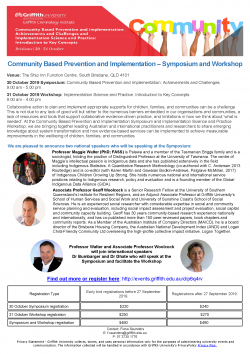CREATE August Update
September 4, 2019
CREATE August Update
4th September, 2019
From the Directors’ Desk – Professors Ross Homel and Greer Johnson (Co-Directors)
It is hard to believe we are already in the back end of 2019 – how time flies!
As flagged in last month’s CREATE RoundUP each second month we will be providing brief updates on what has been happening. This is the first of these updates.
In August, Ross Homel and Kate Freiberg attended a forum on Measuring Child Wellbeing organised by the Commonwealth Department of Education, on behalf of COAG. An important document circulated on the day was a report compiled by the Department of Education in Queensland that provides an excellent literature review and a useful overview of what the states are doing in relation to measuring student wellbeing and engagement.
This month we sent a second email inviting 184 Public Schools in NSW to participate in the CREATE project and use Rumble’s Quest so they may contribute to their local CfC coalition’s community wide data (this email was similar to the one sent to school principals on June 24th). As part of their support for the project, Malcolm Elliot (President-Australian Primary Principals Association) will email all invited school principals (including Queensland schools) as well. APPA is also helping by promoting Rumble’s Quest to APPA members through their newsletter.
The research team has also been liasing with NSW departmental personnel and Network Specialists to arrange a webinar to brief them about Rumble’s Quest, the project and how they can support the use of Rumble’s Quest in NSW schools. Progressing this webinar has been slower than we would have liked with no date yet set for the webinar.
In Queensland, we are still making steady progress with 30% of schools registered to use Rumble’s Quest. This percentage varries depending on sites. For instance, in one site almost all invited CfC schools have signed up. In fact, schools from the whole area have been invited to use Rumble’s Quest. The extension of the invitation was as a result of a recommendation from a recent report that suggested the use of Rumble’s Quest as a basis for the development of flexible education and support services that could help prevent youth crime. This extension is being coordinated with departmental personnel and while it comes at an additional cost to the project budget we feel it is well worth it given the opportunity to trial the use of Rumble’s Quest across a whole area.
We are continuing to discuss ways in which we can inform all state schools about Rumble’s Quest with our Queensland departmental colleagues. For example, in August Kate Freiberg and Sara Branch provided a brief Rumble’s Quest session to a network of Queensland school personnel.
We are also continuing to build on the warm response we received from the Catholic Schools Education Commission in Queensland. In August, Kate and Ross briefed diocesan representatives about Rumble’s Quest and the project. An Expressions of Interest process is currently being coordinated by the Commission. This process should be completed early in September.
The Q&A during August mainly covered Rumble’s Quest. One question concerned the type of information Rumble’s Quest can provide to schools. The answer is that Rumble’s Quest provides schools with age appropriate data about wellbeing that helps them understand how they can support students (eg. if there is a need within a particular grade or section of the school community) and assess if students’ scores have improved in response to their action plans. Rumble’s Quest taps into overall wellbeing but also other factors such as: attachment to school, the experience of supportive home-family relationships, social and emotional confidence, and self-regulation and prosocial behaviour. Importantly the Rumble’s Quest system puts the data into the hands of schools, gives children a voice, and enables schools to promote children’s active involvement in the school community.
We are aiming that 50% of schools within each Queensland CfC community will register to use Rumble’s Quest by Term 1 2020. Rather than directing our efforts state wide, an alternative approach we are considering is to focus on specific sites. This will help ensure that we can test the risk and protective factor methodology (ie., combining the aggregate Rumble’s Quest data with 2015 AEDC item scores and selected government administrative data to compute the 23 community-level child risk and protective factor scores for the CfC community). This will mean very soon deciding which sites to focus our attention and energy on. Those sites closer to the 50% cut off will most likely be the focus of this approach. One implication of the uneven takeup of Rumble’s Quest is that not all CfC communities will be able to have their community child risk and protective factor scores computed.
To help ensure your CfC does receive sufficient aggregate community data, please keep spreading the word to let schools know about Rumble’s Quest and the opportunity they have to contribute to both community level data as well as collect their own indepth school data. The more you do to promote Rumble’s Quest in your area, the more comprehensive and informative community level data (including child risk and protective factor scores) you’ll have.
We are continuing to progress planning for the upcoming Symposium and Workshop planned for October 30th and 31st. A Steering Committee met in July to discuss the Symposium and will be meeting more regularly as the Symposium and Workshop draw closer. We have updated the flyer to include national speaker announcements (see attached). Please feel free to promote these events to others within your networks. We look forward to seeing many of our partners at these events.
The full CREATE RoundUP will return at the end of September,



Category: Project Newsletter
Posted by Creating Pathways Support
